Keeping Traditions Alive
Two weeks ago I flew to Los Angeles to spend Thanksgiving with my son’s family and to keep a family tradition. I packed my English tart tins and a rolling pin in order to introduce my youngest grandchild to making mince tarts. My son has created a very cool play area in a corner of the kitchen, so my little helper and I were able to roll out the tarts on a table just her size while he was preparing the rest of our Thanksgiving dinner.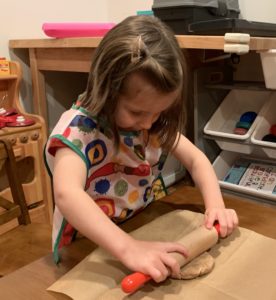
It’s important to me to provide my grandchildren with memories of family traditions. While I am proud of my all-American children and grandchildren, I want them to know their Yorkshire roots as well.
If we had been at my house, we’d have spent that evening looking at old photo albums and playing board games. However, before I had even finished digesting our Thanksgiving feast, out came boxes of Christmas decorations and glittery ornaments. Soon the boxes filled the living room floor, and my kids were reaching into them and pulling out garlands, strings of beads, mantel ornaments and more.
Was it really Christmas now? I usually wait at least a week before dismanteling the pumpkin-themed centerpiece and decorating for the next holiday, but after the first shock was over, found myself getting into the mood. My daughter-in-law gave her young daughter a string of beads to play with and showed her where the garlands would be hung. She also carried on a conversation with Alexa at the same time (“Alexa, play Christmas Carols by Bing Crosby.” “Alexa, play “Let it Snow.”). She soon had me humming holiday tunes, and smiling as she and my son held the mistletoe over their heads. This was their tradition, and I immediately realized I wanted to embrace it.
My Instagram feed tells me similar activities were taking place in the homes of my three other adult children, and by the following weekend, pictures of cherubs placing ornaments on their Christmas trees were flooding my inbox. I decided to go with the flow and I’ll be cutting a tree for my own house tomorrow. Tonight I’ll venture into the garage and locate my ornaments and house decorations. Once the tree goes up, I’ll put on my Christmas CDs, and start addressing cards to my friends and family.
So what does all this mean? Why is my family rushing into Christmas this year? There’s certainly no shortage of pushback, from The Grinch all the way back to Stan Freburg’s Green Christmas in 1958. But no matter – each year we take out the lights, cut a tree, make pumpkin pie and mince tarts, or perhaps tamales or Hoppin’ John, gather with friends and sing carols. Traditional foods, traditional songs, traditional activities – why do we do it? Why does it matter?
Author Frank Sonnenberg believes tradition “contributes a sense of comfort and belonging.” And this is definitely a year when we all need comfort and belonging.
On his blog, Frank Sonnenberg Online, he writes that tradition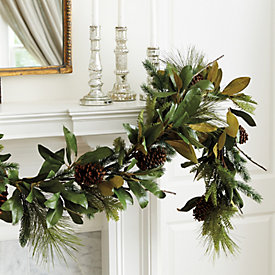
brings families together and enables people to reconnect with friends. [Tradition also] reinforces values such as freedom, faith, integrity, a good education, personal responsibility, a strong work ethic, and the value of being selfless.
That’s a tall order, and I don’t think I ever thought of it that way. I’m not even sure I want my traditions to represent quite so many very specific values. I do know, however, that our family food traditions, like Easter Egg Braid, pumpkin pie, mince tarts, Christmas Eve fondue, and fruitcake just feel right. Memories of past holidays blend together as we prepare and eat these foods. Take fruitcake, for example. Since early childhood, I watched my mother beat the fruitcake batter in October, then drench the round cakes in brandy and wrapping them in waxed paper and aluminum foil and store them in the pantry until December. On Stir Up Sunday, a few weeks later, she made Christmas Pudding. No one in my American family even like these fruit-heavy desserts,, but I keep making them because they connect us to her.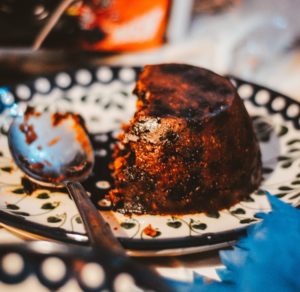
How Do Traditions Start?
Our Christmas Eve fondue tradition started innocently enough one December 24 when my fiance and I made an unplanned visit to future in-laws, who quickly realized they didn’t have enough steak for dinner. Survivors of the Great Depression, they were good at making do. They cut the meat into strips, heated oil in an electric skillet, and provided small dishes of ketchup, mayonnaise, mustard and pickle relish in which to dip the cooked meat. They toasted cubes of French bread and we dipped them into melted Velveeta cheese. (I know!) My husband and I liked the idea so much that when we received two fondue pots for wedding presents we began making two kinds of fondue each year, cheese and meat. But real cheese fondue, not Velveeta. Recently my oldest daughter took over the tradition, adapting it for gluten-free guests with apple slices in addition to bread.
I added Easter Egg Braid to my repertoire when I was writing Organic Cooking for (not-so-organic) Mothers, and my daughter continues that tradition as well. Now the grandchildren ask for it . . .
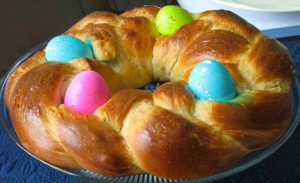
Credit: from TreasureChestofMemories.com
I like the idea that I am bringing my family together with these traditions, if that is what I am doing, and also contributing a sense of comfort and belonging. But that’s not the only reason I take tart tins to Los Angeles or bake cranberry bread with my granddaughter in Virginia. I enjoy spending time with these precious children, and I think they enjoy it too.
What traditions do you participate in each year? Have you observed young people developing their own traditions? If so, I’d love to hear about them! What are your thoughts about traditions, comfort, belonging and values? Do you agree with Frank Sonnenberg? Please use the comment form to share your experiences.
Marlene Bumgarner is an author who enjoys cooking, gardening, and writing about famiy life. To receive essays as they are published, please subscribe on her web page, http://marlenebumgarner.com/blog
Share this post
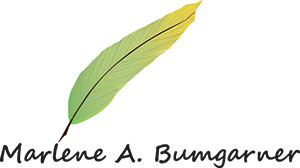




I loved reading your essay about family traditions. I was a fairly young oblivious teenager when my mom started the steak fondue tradition. I never knew that she was searching for a creative way to stretch the ingredients she had on hand. I had always assumed that she wanted to try an exotic new way to do fondue (which was really in vogue back in the late ’60s).
I continued the tradition for a few years when I was on my own, but it has faded away as I adopted various traditions from my in-laws once I got married. I still have the orange fondue pot in the garage and look at it with fond memories. I should use it. Fondue is fun!
Your mom’s Christmas pudding and mince tarts were always appreciated by me. I love those traditions. Early in my first marriage I found a pudding recipe in the Christian Science Monitor and tried it out at my in-laws on Christmas. It was a huge production requiring many ingredients, cheese cloth and a large pot of water to boil it in for hours. The pudding was delicious, although much larger than the five of us could eat. I have vowed to halve the recipe and make it again.
Family dynamics change over time and as I read your words here I reminisced about the holidays I spent with my parents and your parents and you and my brother. I have always enjoyed spending holidays with you.
Jo, how wonderful to read your side of the fondue story! And to know that these family traditions have left you with happy memories. I’m sure you’ve developed your own traditions as the years have passed — you may not even know you did so until you see your children replicating them in their families.